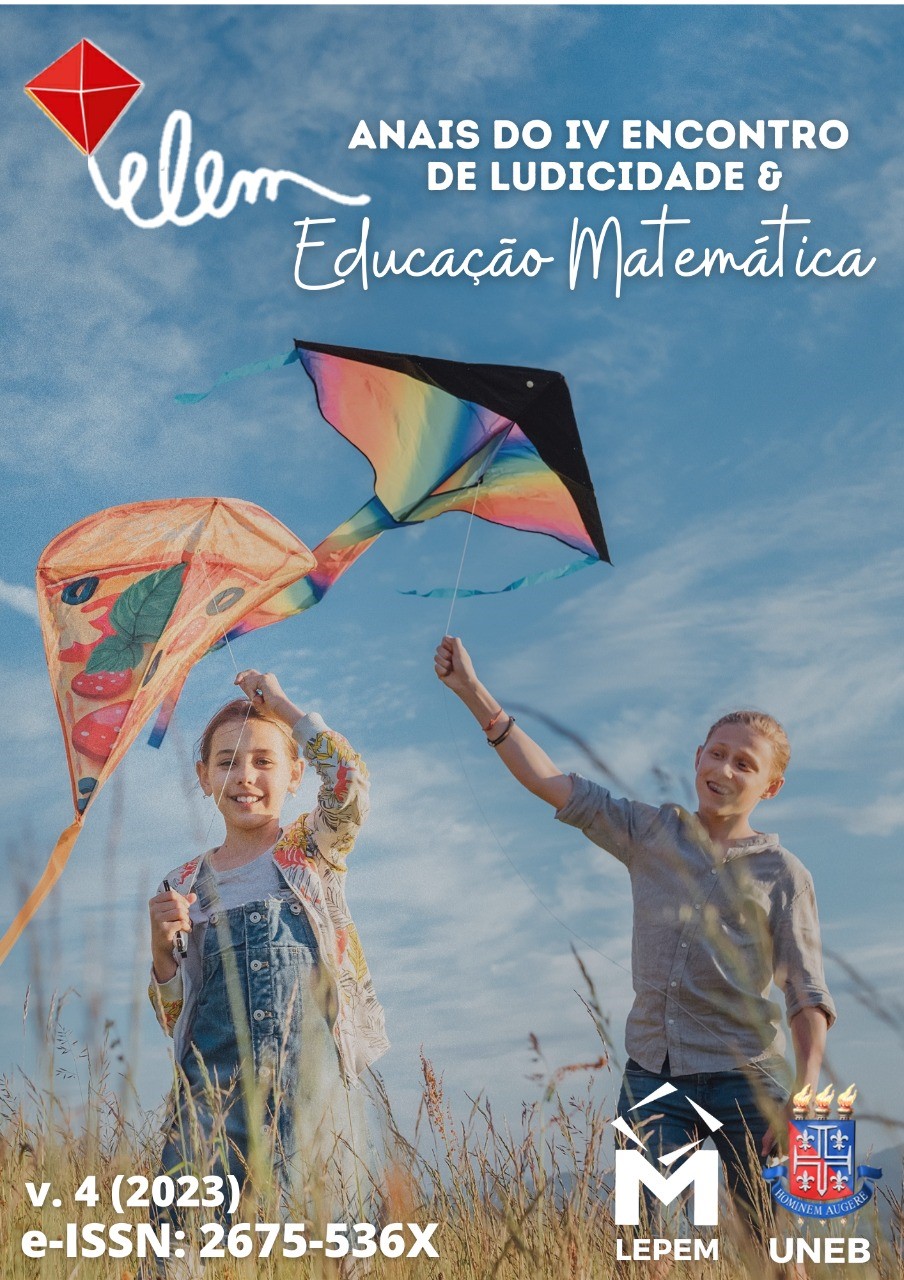INITIATION TO TEACHING
EXPERIENCES WITH GAMES AND MANIPULABLE MATERIALS
Keywords:
Initial teacher training, Mathematics, GamificationAbstract
This text aims to present and reflect on some experiences that occurred from November 2022 to March 2023, in the subproject Literacy in language and mathematics: formative experiences in the Early Years of Elementary Education, of the Pedagogical Residency Program, approved by the CAPES Notice n. 24/2022, linked to the institutional project of the Federal University of Pará (UFPA). For this reflection, aspects about gamification and games in/for teaching were brought together. Methodologically, a descriptive approach was adopted, where systematic records made in the logbook were used. The training activities listed different methodological strategies, including the exploration of the checkerboard mesh, the study of flat and spatial figures, the development/elaboration of activities with BNCC skills, use of concrete materials, gamification, games to develop mathematical logical reasoning and a theoretical-methodological module of mathematics literacy, proposed by the subproject's teacher-supervisor and by the teacher-preceptors.
Downloads
References
BRASIL. Ministério da Educação. Base Nacional Comum Curricular. 2018.
FRAGOSO, W. C. O medo da matemática. Revista Educação, Santa Maria, v. 26, n. 02, p. 95-109, 2001.
GEE, J. P. Bons videogames e boa aprendizagem. Revista Perspectiva, Florianópolis, v. 27, no 1, p. 167-178, jan./ jun. 2009. Disponível em http://www.perspectiva.ufsc.br. Acesso em 19 mar. 2023.
GODOY, A. S. Introdução à pesquisa qualitativa e suas possibilidades. Revista de Administração de Empresas, 35(2), 57-63, 1995.
HUIZINGA, Johan. Homo ludens: o jogo como elemento da cultura / [tradução João Paulo Monteiro]. – 7. ed. São Paulo: Perspectiva, 2012.
LORENZONI, Marcela. Pequeno glossário de inovação educacional. São Paulo: Geekie, 2016.
MAIA, M. G. B.; MARANHÃO, C. Alfabetização e letramento em língua materna e em matemática. Ciênc. Educ., Bauru, v. 21, n. 4, p. 931-943, 2015.
MASOLA, Wilson de Jesus; ALLEVATO, Norma Suely Gomes. Dificuldades de aprendizagem matemática: algumas reflexões. Educação Matemática Debate, v. 3, n. 7, 2019.
MURR, Caroline Elisa. Entendendo e aplicando a gamificação [recurso eletrônico]: o que é, para que serve, potencialidades e desafios. Florianópolis: UFSC: UAB, 2020.
OLIVEIRA, Jorgete Pereira; CHAVES, Evanice. S.; ALVES, José Moysés. As interações sociais na elaboração conceitual em uma aula da primeira série do ensino fundamental. Arquivos Brasileiros de Psicologia, v. 58, n. 1, 2006.
SANTOS, Joyce Alves Muricy dos. A importância do lúdico: o desenvolvimento e a aprendizagem na Educação Infantil. Revista Mais Educação, v. 2, n. 10, 2019.
VYGOTSKY, L.S. A formação social da mente. Trad. José Cipolla Neto et alii. São Paulo, Livraria Martins Fontes, 1984.
Downloads
Published
How to Cite
Issue
Section
License
Copyright (c) 2023 Thamires Yasmim da Cruz Mota, Pedro Augusto Lopes Rosa, Valéria Risuenho Marques

This work is licensed under a Creative Commons Attribution-NonCommercial-ShareAlike 4.0 International License.
Uma nova publicação de artigo anteriormente publicado nos Anais do Encontro de Ludicidade e Educação Matemática, fica sujeita à expressa menção da precedência de sua publicação neste periódico, seguindo as normas de referência. Autores que publicam nos Anais do ELEM concordam com os seguintes termos:
-
O Conselho Editorial se reserva ao direito de efetuar, nos originais, alterações de ordem normativa, sintática, ortográfica e bibliográfica com vistas a manter o padrão culto da língua, respeitando, porém, o estilo dos autores. As provas finais poderão ou não ser enviadas aos autores.
-
Autores mantém os direitos autorais e concedem à revista o direito de primeira publicação, com o trabalho simultaneamente licenciado sob a Licença Creative Commons Attribution (CC BY-NC-SA).
-
Autores têm autorização para assumir contratos adicionais separadamente, para distribuição não-exclusiva da versão do trabalho publicada nos Anais do ELEM; exemplo: publicar em repositório institucional ou como capítulo de livro, com reconhecimento de autoria e publicação inicial nos Anais do ELEM.
-
Autores têm permissão e são estimulados a publicar e distribuir seu trabalho online — em repositórios institucionais, página pessoal, rede social ou demais sites de divulgação científica.





